Comprehensive Guide to Garden Maintenance in Northolt
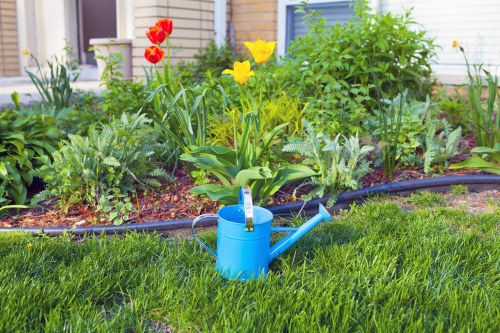
Introduction to Garden Maintenance
Maintaining a beautiful garden in Northolt requires knowledge, dedication, and the right techniques. Whether you're a seasoned gardener or a novice, understanding the essentials of garden upkeep can transform your outdoor space into a vibrant and inviting sanctuary.
Garden maintenance encompasses a variety of tasks, from pruning and weeding to soil management and pest control. Each aspect plays a crucial role in ensuring that your plants thrive and your garden remains aesthetically pleasing throughout the year.
In Northolt, the climate and local conditions present unique challenges and opportunities for gardeners. Adapting your maintenance strategies to suit these factors can significantly enhance the health and beauty of your garden.
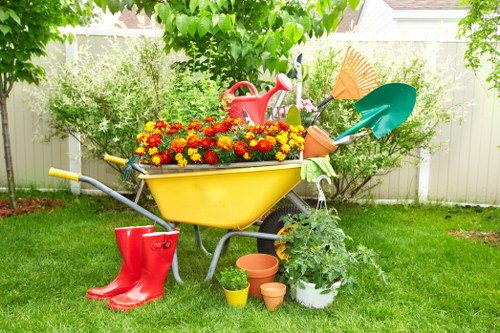
Seasonal Maintenance Tips
Spring Gardening
Spring is a time of renewal, making it the perfect season to start your garden maintenance routine. Begin by clearing out any debris from the winter months and preparing your soil for new plantings.
Key tasks during spring include planting annuals and perennials, pruning shrubs, and fertilizing your plants to encourage robust growth. Additionally, it's essential to address any pest issues early to prevent infestations from taking hold.
Proper irrigation is also crucial in spring, as consistent watering helps establish young plants and supports overall garden health.
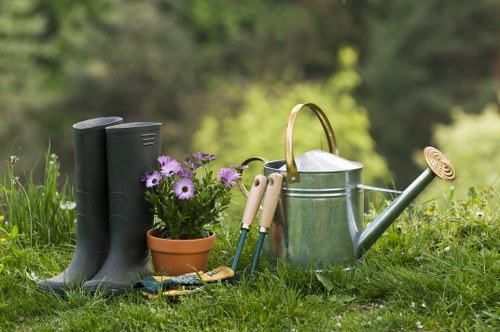
Summer Care
Summer brings intense sunlight and heat, which can stress your plants if not properly managed. Regular watering is essential, but it's important to avoid overwatering, which can lead to root rot and other issues.
Mulching is a valuable practice during the summer months, as it helps retain soil moisture, suppress weeds, and regulate soil temperature. Choose organic mulches such as bark or compost to enhance soil fertility.
Deadheading flowers and removing spent blooms not only keeps your garden looking tidy but also encourages continuous flowering and growth.
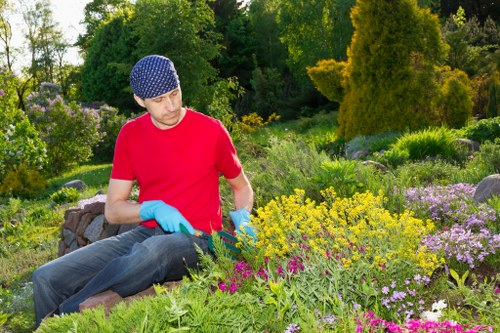
Autumn Preparations
As autumn approaches, it's time to prepare your garden for the cooler months ahead. Start by harvesting any remaining vegetables and fruits, and clear out any dead or diseased plant material.
Pruning trees and shrubs in the autumn helps maintain their shape and removes any weak or damaged branches. This practice also reduces the risk of storm damage during the winter.
Additionally, aerating your soil and adding compost can improve its structure and fertility, setting the stage for a healthy garden in the spring.
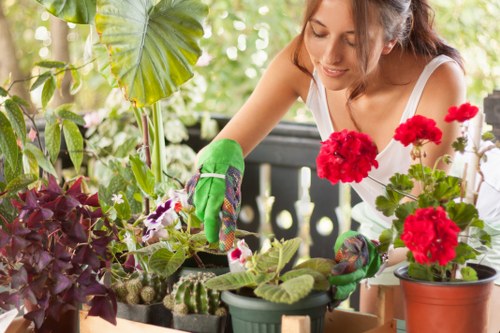
Winter Care
Winter is a quieter time for garden maintenance, but it's still important to take precautions to protect your plants. Applying mulch around the base of plants can insulate their roots and prevent frost damage.
Covering delicate plants with frost cloths or burlap provides an extra layer of protection against harsh winter weather. It's also a good time to plan your garden layout and make any necessary repairs to tools and equipment.
By taking these steps, you ensure that your garden stays healthy and ready to flourish when spring arrives.

Essential Garden Tools
Having the right tools is essential for effective garden maintenance. Investing in high-quality equipment can make your gardening tasks easier and more efficient.
- Pruning Shears: Ideal for trimming and shaping plants.
- Garden Fork: Perfect for aerating soil and turning compost.
- Watering Can: Essential for precise watering, especially for young plants.
- Hand Trowel: Useful for planting, weeding, and digging small holes.
- Garden Gloves: Protect your hands from thorns, dirt, and pests.
Maintaining your tools by cleaning and storing them properly extends their lifespan and ensures they remain effective for your gardening needs.

Soil Health and Fertilization
Healthy soil is the foundation of a thriving garden. Understanding soil composition and maintaining its fertility are critical aspects of garden maintenance in Northolt.
Soil testing helps determine the pH and nutrient levels, allowing you to make informed decisions about amendments and fertilizers. Adding organic matter such as compost improves soil structure, drainage, and nutrient content.
Regular fertilization provides essential nutrients that support plant growth. Choose fertilizers that match the specific needs of your plants, whether they require more nitrogen, phosphorus, or potassium.

Pest and Disease Management
Effective pest and disease management is crucial for maintaining a healthy garden. Implementing preventive measures and monitoring your plants regularly can help identify issues before they become severe.
- Integrated Pest Management (IPM): Combines biological, cultural, and chemical methods to control pests sustainably.
- Natural Predators: Encourage beneficial insects like ladybugs and lacewings that prey on harmful pests.
- Proper Sanitation: Remove fallen leaves and debris that can harbor pests and diseases.
- Resistant Varieties: Plant disease-resistant species to reduce the likelihood of infestations.
By adopting these strategies, you can minimize the impact of pests and diseases on your garden.

Pruning and Trimming
Regular pruning and trimming are essential for shaping plants, promoting growth, and preventing diseases. Understanding the proper techniques for different plant types ensures that your garden remains healthy and attractive.
When to Prune: Different plants have specific pruning seasons. For instance, spring-flowering shrubs are best pruned after they bloom, while summer-flowering varieties can be pruned in late winter.
Pruning Techniques: Use clean, sharp tools to make precise cuts. Remove dead or diseased branches, and thin out crowded areas to improve air circulation and light penetration.

Lawn Care
A well-maintained lawn enhances the overall appearance of your garden. Proper lawn care involves regular mowing, watering, and fertilizing to keep the grass healthy and vibrant.
- Mowing: Cut your grass to the recommended height for the specific type of grass you have. Avoid cutting more than one-third of the grass blade at a time.
- Watering: Deep, infrequent watering encourages deep root growth. Aim for early morning watering to reduce evaporation and fungal growth.
- Fertilizing: Apply a balanced fertilizer during the growing season to provide essential nutrients.
Regular aeration and occasional overseeding can also help maintain a lush and dense lawn.

Mulching Benefits
Mulching is a vital practice in garden maintenance that offers numerous benefits. It helps retain soil moisture, suppresses weed growth, and regulates soil temperature, creating a more favorable environment for plant roots.
Types of Mulch: Organic mulches such as wood chips, straw, and compost break down over time, enriching the soil. Inorganic options like gravel or rubber do not decompose but are effective for long-term weed control.
Applying mulch around your plants not only improves their health but also enhances the visual appeal of your garden by providing a neat and finished look.

Watering Strategies
Effective watering is crucial for maintaining a healthy garden in Northolt's climate. Understanding the water needs of different plants and implementing efficient watering practices can prevent both drought stress and waterlogging.
- Drip Irrigation: Delivers water directly to the plant roots, minimizing evaporation and runoff.
- Rainwater Harvesting: Collecting and using rainwater reduces dependence on municipal water sources and provides natural, soft water for your plants.
- Morning Watering: Watering in the early hours reduces evaporation and fungal growth, ensuring that plants absorb moisture effectively.
Adjust your watering schedule based on seasonal changes and the specific needs of your garden to maintain optimal moisture levels.

Plant Selection
Choosing the right plants is a fundamental aspect of successful garden maintenance. Selecting species that are well-suited to Northolt's climate, soil, and light conditions ensures that your garden remains vibrant and low-maintenance.
Native Plants: Incorporating native species can reduce maintenance needs as they are adapted to the local environment and require less water and care.
Perennials vs. Annuals: Perennials provide long-term beauty and require less replanting, while annuals offer seasonal color and flexibility in design.

Composting Practices
Composting is an eco-friendly method of recycling garden and kitchen waste into valuable organic matter. It enhances soil fertility, improves soil structure, and promotes beneficial microbial activity.
How to Compost: Create a compost pile or use a compost bin, layering green materials (like vegetable scraps) with brown materials (such as leaves and straw). Maintain the pile by regularly turning it to aerate and speed up decomposition.
Once the compost has fully decomposed into dark, crumbly material, it can be used as a nutrient-rich amendment for your garden beds and containers.

Integrated Garden Design
Effective garden maintenance is closely tied to thoughtful garden design. Planning your garden layout with maintenance in mind can reduce labor and enhance the beauty and functionality of your outdoor space.
- Plant Placement: Group plants with similar water and sunlight requirements together to simplify care routines.
- Pathways and Access: Design clear pathways to allow easy access for maintenance tasks without disturbing plant roots.
- Plant Diversity: Incorporate a variety of plants to promote biodiversity, which can naturally control pests and improve soil health.
A well-designed garden not only looks appealing but also makes ongoing maintenance more manageable and enjoyable.

Eco-friendly Garden Practices
Adopting eco-friendly practices in your garden maintenance can benefit both your local environment and your gardening efforts. Sustainable methods promote biodiversity, conserve resources, and reduce environmental impact.
Organic Gardening: Avoid synthetic chemicals by using natural fertilizers and pest control methods, which are safer for beneficial insects and local wildlife.
Water Conservation: Implementing water-saving techniques like mulching, drip irrigation, and rainwater harvesting helps preserve this vital resource.

Common Garden Problems and Solutions
Gardening in Northolt can present various challenges, from pest infestations to soil deficiencies. Identifying common garden problems and implementing effective solutions ensures the continued health and beauty of your garden.
- Weed Control: Regular weeding and mulching are effective ways to manage unwanted plants.
- Soil Compaction: Aerating the soil helps improve drainage and root growth.
- Pest Management: Utilize integrated pest management strategies to keep harmful pests in check.
Proactively addressing these issues can prevent minor problems from escalating into major setbacks.

Advanced Gardening Techniques
For those looking to take their garden maintenance to the next level, advanced techniques can enhance plant health and garden productivity. These methods require a deeper understanding of plant biology and garden ecology.
Companion Planting: Growing compatible plants together can improve growth, repel pests, and maximize space.
Vertical Gardening: Utilizing vertical space with trellises, cages, and other structures allows for increased plant density and can create stunning visual effects.

Hiring Professional Gardeners in Northolt
While DIY garden maintenance is rewarding, there are times when hiring a professional gardener in Northolt can be beneficial. Professionals bring expertise, efficiency, and specialized knowledge to tackle complex gardening tasks.
Benefits of Professional Services: Access to expert advice, time savings, and high-quality results are some of the advantages of hiring a garden maintenance service.
If you're looking to enhance your garden without the hassle of doing it yourself, consider reaching out to a local professional.
Ready to transform your garden? Contact us today to schedule your garden maintenance service in Northolt and enjoy a beautiful, thriving outdoor space all year round!